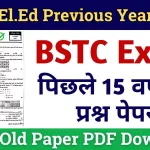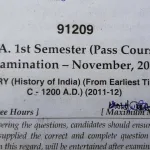The Bachelor of Commerce (BCom) program at Calicut University is designed to provide students with a solid foundation in various aspects of commerce and business. The 4th semester is a critical juncture in the BCom curriculum, where students delve deeper into specialized subjects.
Previous year question papers are invaluable resources for students preparing for their exams, offering insights into the exam pattern, types of questions, and important topics.
Calicut University BCom 4th Semester Previous Year Question Paper with Answers
Subject: Financial Management
Question Paper:
- Define Financial Management. What are its objectives?
- Answer: Financial Management is the efficient and effective management of money (funds) in such a manner as to accomplish the objectives of the organization. Its main objectives are:
- Ensuring a regular and adequate supply of funds to the concern.
- Ensuring adequate returns to shareholders.
- Ensuring optimum funds utilization.
- Ensuring safety on investment.
- Planning a sound capital structure.
- Answer: Financial Management is the efficient and effective management of money (funds) in such a manner as to accomplish the objectives of the organization. Its main objectives are:
- Explain the concept of Working Capital. What are its determinants?
- Answer: Working capital refers to the capital used in day-to-day trading operations, calculated as the current assets minus the current liabilities. Determinants of working capital include:
- Nature of business
- Business cycle
- Production cycle
- Credit policy
- Operating efficiency
- Market conditions
- Answer: Working capital refers to the capital used in day-to-day trading operations, calculated as the current assets minus the current liabilities. Determinants of working capital include:
- Discuss the different sources of long-term finance available to a business.
- Answer: Sources of long-term finance include:
- Equity shares
- Preference shares
- Debentures
- Term loans from financial institutions
- Retained earnings
- Venture capital
- Public deposits
- Leasing and hire purchase
- Answer: Sources of long-term finance include:
- What is the importance of Capital Budgeting? Explain any two techniques of Capital Budgeting.
- Answer: Capital Budgeting is crucial for:
- Evaluating investment opportunities.
- Making long-term investment decisions.
- Maximizing shareholder wealth.
- Ensuring effective allocation of resources.
- Techniques include:
- Net Present Value (NPV): Calculates the difference between the present value of cash inflows and outflows over a period of time.
- Internal Rate of Return (IRR): The discount rate at which the net present value of all the cash flows from a project equals zero.
- Answer: Capital Budgeting is crucial for:
- What are the advantages and disadvantages of issuing debentures?
- Answer:
- Advantages:
- Fixed interest payments.
- No dilution of control.
- Tax benefits.
- Disadvantages:
- Obligation to pay interest.
- Increased financial risk.
- Collateral requirement.
- Advantages:
- Answer:
Subject: Business Regulatory Framework
Question Paper:
- Define a contract. What are the essential elements of a valid contract?
- Answer: A contract is a legally binding agreement between two or more parties. Essential elements include:
- Offer and acceptance
- Intention to create legal relations
- Lawful consideration
- Capacity of parties
- Free consent
- Lawful object
- Certainty and possibility of performance
- Legal formalities
- Answer: A contract is a legally binding agreement between two or more parties. Essential elements include:
- Explain the concept of ‘Free Consent’ in contract law.
- Answer: Free consent means that parties to a contract must agree upon the same thing in the same sense. Consent is said to be free when it is not caused by:
- Coercion
- Undue influence
- Fraud
- Misrepresentation
- Mistake
- Answer: Free consent means that parties to a contract must agree upon the same thing in the same sense. Consent is said to be free when it is not caused by:
- Discuss the rights and duties of a partner in a partnership firm.
- Answer:
- Rights of a Partner:
- Right to take part in the conduct of the business.
- Right to be consulted.
- Right to access books and accounts.
- Right to share profits.
- Duties of a Partner:
- Duty to carry on the business to the greatest common advantage.
- Duty to be just and faithful to each other.
- Duty to render true accounts.
- Duty to indemnify for fraud.
- Rights of a Partner:
- Answer:
- What are the different types of negotiable instruments under the Negotiable Instruments Act, 1881?
- Answer: Types include:
- Promissory Notes
- Bills of Exchange
- Cheques
- Answer: Types include:
- Explain the concept of ‘Consumer Protection’ under the Consumer Protection Act, 1986.
- Answer: Consumer Protection refers to the rights of consumers to be protected against the marketing of goods and services that are hazardous to life and property. It includes:
- Right to safety
- Right to be informed
- Right to choose
- Right to be heard
- Right to seek redressal
- Right to consumer education
- Answer: Consumer Protection refers to the rights of consumers to be protected against the marketing of goods and services that are hazardous to life and property. It includes:
Sample question papers and answers for bcom 4th sem previous year question papers calicut university
Below are sample questions and model answers for each core subject in the BCom 4th semester.
Corporate Accounting
Question 1: Explain the accounting treatment for the redemption of preference shares.
Answer: The redemption of preference shares involves the repayment of the amount to the preference shareholders, which can be done either out of profits or out of a fresh issue of shares. The accounting treatment is as follows:
- Out of Profits:
- Transfer the required amount to the Capital Redemption Reserve (CRR) from profits.
- Debit the preference share capital account and credit the bank account.
- Out of Fresh Issue:
- Issue new shares and credit the share capital account.
- Use the proceeds to redeem the preference shares.
Question 2: Discuss the methods of valuing goodwill in a company.
Answer: Goodwill can be valued using several methods:
- Average Profit Method: Average profit of the past few years is multiplied by the number of years’ purchase.
- Super Profit Method: Super profit (excess of average profit over normal profit) is multiplied by the number of years’ purchase.
- Capitalization Method: Capitalizing the average or super profit at the normal rate of return.
Financial Management
Question 1: What are the main objectives of financial management?
Answer: The primary objectives of financial management are:
- Profit Maximization: Ensuring the company generates maximum profit.
- Wealth Maximization: Maximizing the value of the shareholders’ wealth.
- Ensuring Liquidity: Maintaining adequate liquidity to meet short-term obligations.
- Efficient Utilization of Funds: Ensuring the funds are used efficiently and effectively.
- Ensuring Financial Discipline: Maintaining financial control and discipline within the organization.
Question 2: Explain the concept of working capital management and its importance.
Answer: Working capital management involves managing the short-term assets and liabilities of a company to ensure it operates efficiently. It is important because it helps maintain smooth operations, ensures the company can meet its short-term obligations, and improves profitability by optimizing the use of current assets and liabilities.
Business Communication and Report Writing
Question 1: What are the essential elements of an effective business report?
Answer: An effective business report should include the following elements:
- Title Page: Includes the report title, author’s name, and date.
- Table of Contents: Lists the sections and page numbers.
- Executive Summary: Provides a brief overview of the report’s key points.
- Introduction: Introduces the topic and objectives of the report.
- Body: Contains the main content, organized into sections with headings.
- Conclusion: Summarizes the findings and recommendations.
- Appendices: Includes additional material such as charts, graphs, and tables.
- References: Lists the sources used in the report.
Question 2: Describe the process of effective communication in a business environment.
Answer: Effective communication in a business environment involves the following steps:
- Idea Generation: Developing the message to be communicated.
- Encoding: Translating the idea into a message using appropriate language and symbols.
- Transmission: Sending the message through a chosen communication channel.
- Reception: The recipient receives the message.
- Decoding: The recipient interprets and understands the message.
- Feedback: The recipient responds to the message, providing feedback to the sender.
- Noise: Identifying and minimizing any barriers or disturbances that may affect communication.
Business Laws
Question 1: Explain the key provisions of the Indian Contract Act, 1872.
Answer: The Indian Contract Act, 1872, outlines the following key provisions:
- Offer and Acceptance: A valid contract requires a lawful offer by one party and acceptance by another.
- Consideration: There must be a lawful consideration for the contract.
- Capacity to Contract: Parties must be competent to enter into a contract (i.e., of legal age, sound mind, and not disqualified by law).
- Free Consent: Consent of the parties must be free from coercion, undue influence, fraud, misrepresentation, or mistake.
- Lawful Object: The object of the contract must be lawful.
- Agreement Not Declared Void: The agreement must not be expressly declared void by the Act.
Question 2: Discuss the concept of ‘Breach of Contract’ and its remedies.
Answer: A breach of contract occurs when one party fails to fulfill their obligations under the contract. Remedies for breach of contract include:
- Damages: Monetary compensation for losses suffered.
- Specific Performance: Court order directing the defaulting party to fulfill their contractual obligations.
- Injunction: Court order preventing a party from doing something that breaches the contract.
- Rescission: Cancellation of the contract, with parties returning to their pre-contractual positions.
Cost Accounting
Question 1: What are the various methods of costing?
Answer: The various methods of costing include:
- Job Costing: Costs are assigned to specific jobs or batches.
- Process Costing: Costs are assigned to processes or departments.
- Activity-Based Costing (ABC): Costs are assigned based on activities that drive costs.
- Standard Costing: Predetermined costs are used for comparison with actual costs.
- Marginal Costing: Only variable costs are considered for decision-making.
Question 2: Explain the concept of variance analysis in cost accounting.
Answer: Variance analysis involves comparing actual costs to standard costs to identify and analyze differences (variances). Variances can be:
- Material Variances: Differences in material cost and usage.
- Labor Variances: Differences in labor cost and efficiency.
- Overhead Variances: Differences in overhead costs. Variances help identify areas of inefficiency and control costs.
Importance of Previous Year Question Papers
Previous year question papers serve multiple purposes in exam preparation:
- Understanding Exam Pattern: They help students familiarize themselves with the structure of the exam, including the distribution of marks, types of questions (objective, subjective, case studies, etc.), and time allocation.
- Identifying Important Topics: Analyzing past papers can highlight frequently asked questions and important topics, enabling students to focus their study efforts more effectively.
- Enhancing Time Management: Practicing with previous papers allows students to develop time management skills, ensuring they can complete the exam within the allotted time.
- Boosting Confidence: Regular practice with actual exam questions builds confidence and reduces exam anxiety, as students become more comfortable with the format and difficulty level.
Overview of BCom 4th Semester Subjects
- Corporate Accounting
- Advanced principles and practices in accounting for corporations.
- Preparation of final accounts, financial statements, and advanced accounting techniques.
- Interpretation and analysis of financial statements.
- Business Regulatory Framework
- Introduction to various business laws and regulations.
- Understanding legal aspects of business operations in India.
- Laws related to contracts, partnerships, companies, and consumer protection.
- Business Statistics
- Introduction to statistical methods used in business.
- Probability theory and its applications in business decision-making.
- Statistical tools and techniques for data analysis.
- Managerial Economics
- Application of economic theory to managerial decision-making.
- Demand analysis, production and cost analysis, pricing decisions.
- Market structures and their implications for business decisions.
- Business Communication
- Principles of effective communication in business.
- Business correspondence, reports, and presentations.
- Oral communication skills and techniques.
- Business Environment
- Understanding the economic, social, political, and technological environment in which businesses operate.
- Impact of government policies on business decisions.
- Globalization and its implications for business.
- Information Technology and its Applications in Business
- Introduction to IT and its applications in business.
- E-commerce, ERP systems, and other IT tools for business operations.
- Management of information systems.
- Financial Management
- Principles and techniques of financial management.
- Capital budgeting, cost of capital, and capital structure decisions.
- Working capital management and financial planning.
- Quantitative Techniques for Business
- Application of quantitative methods in business decision-making.
- Operations research techniques and their applications.
- Mathematical models for business problems.
Frequently Asked Questions (FAQ) about BCom 4th Sem Previous Year Question Papers for Calicut University
- Where can I find previous year question papers for BCom 4th Semester of Calicut University?
- Previous year question papers for BCom 4th Semester can typically be found on the official website of Calicut University. You can also check the university’s library, departmental notice boards, or online educational forums and websites that specialize in providing academic resources.
- Are previous year question papers available in both printed and digital formats?
- Yes, previous year question papers are often available in both printed and digital formats. You can access digital copies on the university’s official website or educational portals. Printed copies may be available in the university library or from senior students.
- How can previous year question papers help in exam preparation?
- Previous year question papers help students understand the exam pattern, types of questions frequently asked, and the level of difficulty. They are useful for practice, identifying important topics, and improving time management skills during exams.
- Can I get previous year question papers with answers?
- While the university might not officially provide question papers with answers, some educational websites and student forums may offer solved papers. You can also discuss and solve these papers with classmates or seek help from professors.
- Are the question papers for all subjects in BCom 4th Semester available?
- Generally, question papers for all subjects within the BCom 4th Semester should be available. However, availability may vary based on the subject and the year. It’s advisable to check multiple sources if you need papers for specific subjects.
- How many years of previous question papers should I refer to for effective preparation?
- Referring to question papers from at least the last five years can provide a comprehensive understanding of the exam pattern and important topics. This can also help in identifying any changes in the syllabus or question trends over the years.
- Are there any official guidebooks or resources recommended by Calicut University for exam preparation?
- Calicut University may recommend certain textbooks, reference books, and guidebooks for each subject. It’s best to refer to the syllabus and check with your professors for any official recommendations.
- Can I get access to previous year question papers through the university’s online portal?
- Yes, many universities, including Calicut University, provide access to previous year question papers through their official online portals or digital libraries. You may need to log in with your student credentials to access these resources.
- Is there a cost associated with obtaining previous year question papers?
- Officially provided previous year question papers by the university are typically free of cost. However, if you are purchasing printed compilations or accessing papers through third-party websites, there may be a fee involved.
- What should I do if I cannot find a specific previous year question paper?
- If you cannot find a specific question paper, you can reach out to your professors, department office, or the university library for assistance. Networking with senior students and joining study groups or academic forums can also be helpful.
Latest Posts
- Step-by-step guide to download and apply for jee mains admit card 202
- Comprehensive 2025 government holidays and recruitment details for job seekers
- JEE Mains Admit Card 2025: Your Step-by-Step Guide to Downloading the Hall Ticket
- Everything You Need to Know About 2025 Government Holidays Recruitment
- Comprehensive Guide to rrb d group recruitment 2025 – Eligibility, Vacancies, and Application
- Detailed guide to nps trust recruitment 2025 vacancies, eligibility and apply process
- Comprehensive guide to hpcl recruitment 2025 notification, vacancies, and application process
- ignou bed admission 2025 complete recruitment guide with eligibility and process
- Comprehensive Guide to Indian Army Agniveer Recruitment 2025 Notification and Jobs
- Everything You Must Know About CBSE Board Exams 2025 Changes & New Rules






